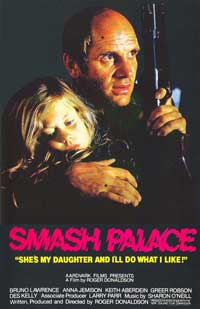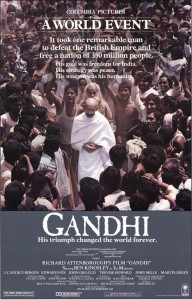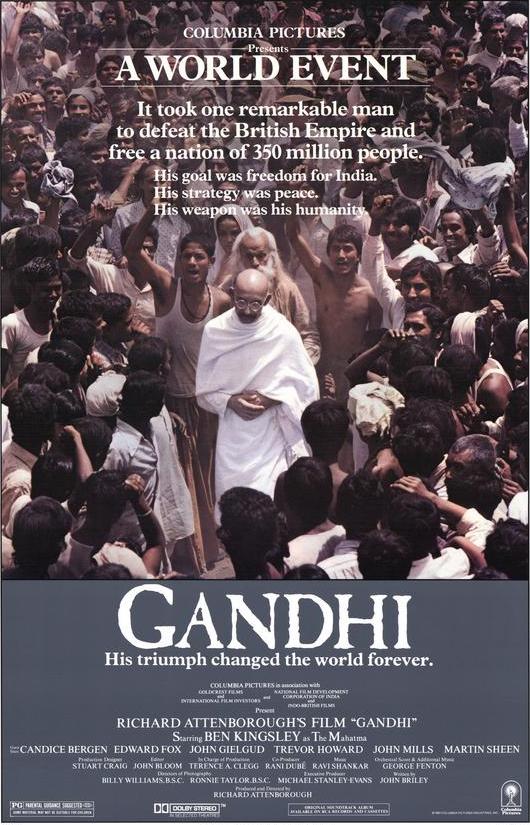
Titles alphabetically I happened to check out on Netflix in the month of April:
Carnival of Souls (1962) is a low-budget horror flick occupied by creepy ingredients of phantoms and lost souls rising from the dead just to haunt and pester a blonde chick named Mary Henry (Candace Hilligoss). The haunting begins following a near death experience where she was the sole survivor of a car wreck, and the assumption is that in her brief tour of purgatory she might have provoked evil spirits to travel back with her. The interest of watching this now is because it undoubtedly inspired ideas and motifs that were used in the current horror throat-grabber “Insidious.” But our blonde heroine is equally shocked by every spirit visit with equal shrieking reactions, and she never seeks out friends or confides with her psychiatrist the right concerns. At 76 minutes, the phantasmagoric black & white can be alluring as visual technique. But the scare tactics teeter on tedious. C
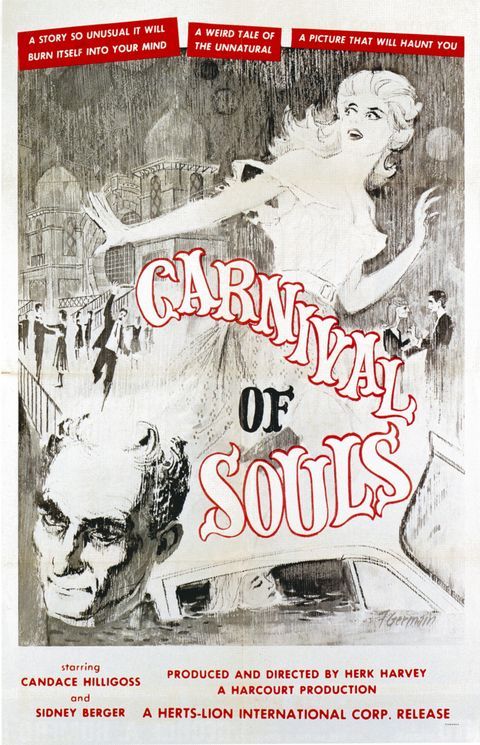
Fail-Safe (1964) explored the Atomic Age and nuclear holocaust possibilities in the same year as Stanley Kubrick’s “Dr. Strangelove,” but Sidney Lumet’s film though is straight drama. Walter Matthau’s first party speech is surprisingly gripping and applicable with today’s times (I have no idea what the subsequent scene of him driving Ms. Wolf home is doing in this movie). Henry Fonda, the most placid and unassuming of all actors, is perfect to play a President with an anti-communist stance. For the first hour, I was thinking, that while dated, the film works as a kaleidoscope into the 60’s socio-political times, as well as accurate time capsule into our then technology capabilities. The contrived dogma still makes it pale in comparison to Kubrick’s masterwork but in a number of ways the two films at times mirror each other. Any big fan of “Dr. Strangelove” should see this one day to better understand the Cold War fever of the time and note the comparisons. And any big fan of Lumet, a director who always stuck to his non-commercial guns, should see this too. B+
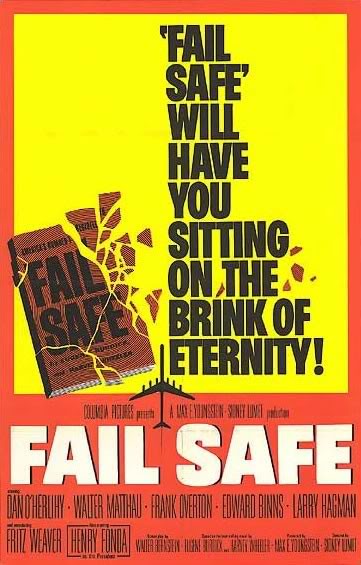
Flipped (2010) remembers the awkwardness of first love at a preteen age when it was coined more as a “crush.” Directed by Rob Reiner of “Stand by Me” and “The Princess Bride,” his film is able to get away with such tender innocence most certainly because it’s set primarily in idyllic 1963. This was an era that came before any cynical-inducing world events could beset the traditional wholesome American nuclear family. The film itself is the kind of sweet, wholesome movie that people hope for but don’t think exist anymore – with so much friction in the world today it’s a relief to get entertainment that’s on the “nice” side. Bryce (Callan McAuliffe) and Julianna (Madeline Carroll) are neighbors at 8-years old, and spend the next several informative years blossoming a crush for each other – and at times bewildered by annoyances of each other – met with the resistance and bashfulness that comes with first crush feelings. This is a movie that remembers how when the opposite sex engages initial conversation, the stun of the encounter often left you dumbfounded and with unconstrained dopey comments – the kind you wish you could take back the moment they left your mouths! Flippin’ Lovely, the boy and girl written with equal warmth and insight. B+
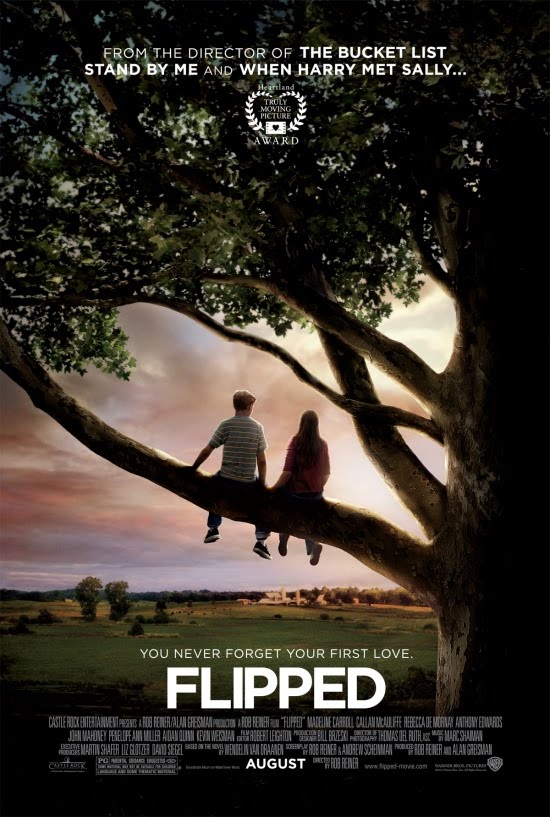
Gandhi (1982) is one of the great epic biopics and without a doubt Ben Kingsley’s performance is an extraordinary body and spirit embodiment, the kind an actor himself finds when he devotes himself to daily meditation and surrender of material belongings. Most people feel too tired to sit through a 190 minute patronizing civics lesson, but that is not this. While an epic of this size requires time investment, it ultimately elevates to pinnacles of wisdom and to an awareness of human dignity that most church worships aspire to but never achieve. (When I say church worships, I’m talking this film is more life-considering than your typical Sunday congregation.) The film uses a canvas of the many years it took for Mahatma Gandhi to bring India together to liberate from British rule in the mid-20thcentury. Incidentally, Gandhi endures unjust arrests and witnessed beatings of his people yet all the same upheld non-violent resistance. The words of Gandhi, conveyed through Kingsley’s humble but emotive enunciations, are so powerfully deep and ideally theoretical that it could be a calling to your new worldview. His doctrine is not just for the benefit of India, but a multi-cultural ideology that could benefit mankind. Not a work of simple piety either, because Kingsley and the screenplay lets us see the meek shortcomings of an ordinary man before he became a leader. Acknowledged as well is the struggles between Muslims and Hindus in the final third of the film that impelled Gandhi to willingly die by fasting or until peace resolved between sides. The film over the years has gotten the shaft because of its 8 Academy Award wins including Best Picture – we’re disgruntled at it before viewing it because of looking at what lost. No, I don’t even think “Gandhi” is a sure-fire greater film than “E.T.” or “Tootsie” or “Blade Runner” or “The Verdict” if I had to choose between children. But this is exactly why the Academy Award pooling process is a silly way to clinch one “winner.” In a sane world, the Academy would see something distinctive is up and seal every one of those films with gold based on their prospective genre merits. A
Machete (2010) is a chink disappointment that is not one-tenth as cool as the mock trailer in “Grindhouse” that inspired it three years ago. Danny Trejo is the title anti-hero with a leathery face and freakish revenge-hungry eyes, Steven Seagal and his big belly is the kingpin baddie, Jeff Fahey is the dirty sandpaper-beard businessman, and Robert DeNiro is the strong accented Texas politician campaigning against illegal immigrants. Jessica Alba, Michelle Rodriguez and Cheech Marin are on Machete’s side. Some shots have been lifted from the “Grindhouse” trailer and integrated into this Robert Rodriguez movie in a gratifying way. But the one shot not expounded from the trailer is the one with Machete enticed between two naked well-endowed women in a swimming pond. That omission says something about why it fails, that it is more concerned with flesh-tearing action than it is with good rowdy sex. It’s self-satisfied with being a one-dimensional action flick. C-
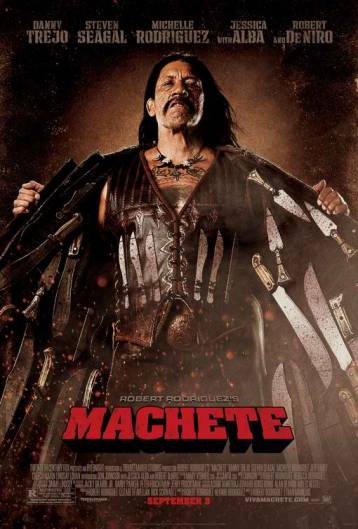
Mon Oncle (1958) starts as a sublime post-modernist architecture satire as a family tries to become accustomed to the gadgets in their lives. It’s like Chaplin’s “Modern Times,” with bits involving a kitchen making a breakfast with a push of a button, electric garage door openers that trap people in, and a running gag of a malfunctioning dolphin fountain. For a half hour you are watching a masterpiece, or so you think. But Jacques Tati has no idea for pacing, and the funny ideas get less and less frequent. The inspired dinner party sequence at the 70-minute mark should have been the climax. But it drones onto 116 minutes, and I fast-forwarded through to the end. In French with English subtitles. It became the Academy Award winner for Best Foreign Film. C
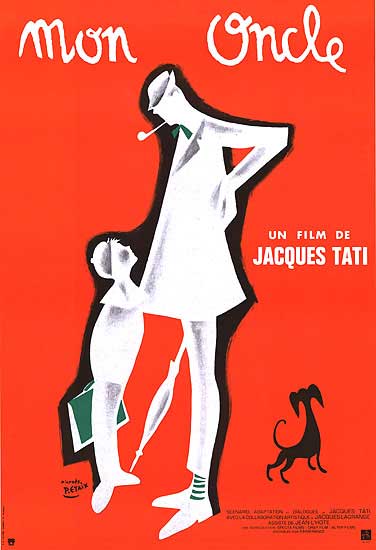
Ronin (1998) is a knotty double-crossing heist movie notably known for its superbly crafted car chases and for its trotting European locations. Robert DeNiro, as ex-CIA, joins a squad of mercenaries for hire and proves that he is the most skilled and knowledgeable among the outfit. Irish boss (Natascha McElhone) will pay her crew generously to retrieve a suitcase with unknown but certainly valuable contents. The chief mastermind is schmiel Jonathan Pryce who is unconvincing as a baddie with dangerous fighting movies. The Russian ice skating show is a good location idea for a climax, but the unseemly bad choreography as well as dim-witted decision-making by the rogues turns this semi-interesting underworld crime flick into a mildly OK movie that’s just too faulty by the end. C+
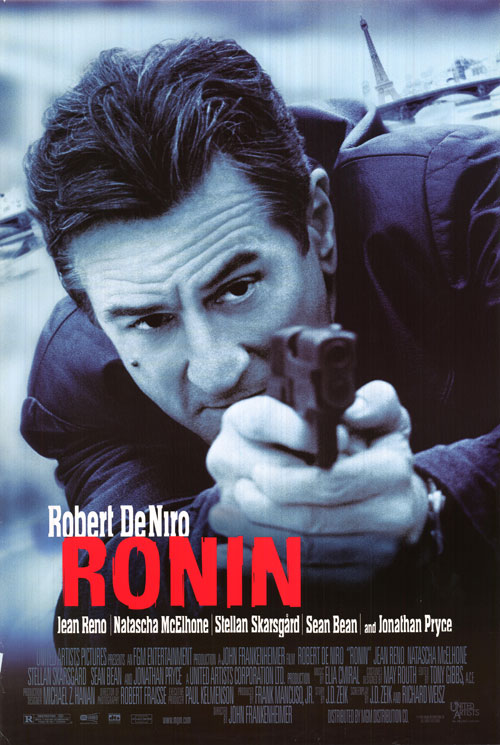
Smash Palace (1981) is a marriage disintegration drama from New Zealand that cuts deep. It begins in a way that makes you afraid there won’t be any distinguishable and full-blooded characters, and then surprises you with how fleshed out the characters are and how dramatically involving it becomes. Bruno Lawrence and Anna Maria Monticelli are married people at wit’s end with each other, addicted to shouting at each other. It’s easy to side with the wife. Then there is an affair with a best friend. Then there are custody issues, and then destructive measures are acted out. It’s a believable escalation that is like something ripped out of sensationalist tabloids. This is the same kind of story issues as explored in the recent “Blue Valentine” but somehow this one tops it. Directed by a young Roger Donaldson (“No Way Out,” “Thirteen Days,” “The Bank Job”). B+
